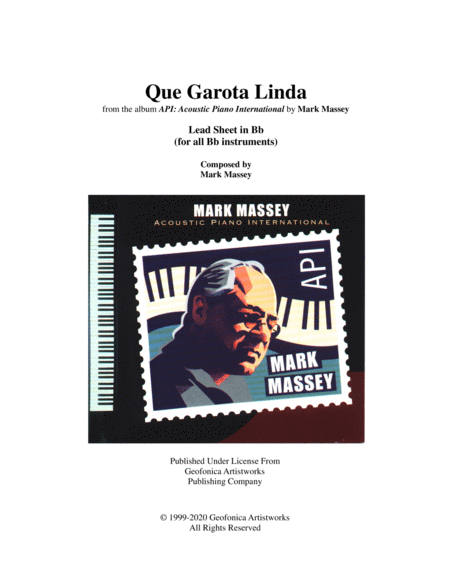Small Ensemble Clarinet,Tenor Saxophone,Trumpet - Level 4 - Digital Download SKU: A0.948698 Composed by Mark S. Massey. Jazz,Latin. Score and parts. 5 pages. Geofonica Artistworks #6038067. Published by Geofonica Artistworks (A0.948698). This is a Bb lead sheet (including original flute and piano lines, transposed for Bb instruments) for Que Garota Linda. It's a high energy, very exciting, Brazilian-Latin style instrumental from pianist Mark Massey's breakthrough jazz LP: API: Acoustic Piano International. The piano and flute interact, with the flute (performed by guest flutist Justo Almario) and piano trading sections of the main melody, and then providing dynamic background hooks and counterpoint. (These piano-flute lines are transposed here for Bb instruments. The tune is a great vehicle for musical interplay, jazz improvisation, and high energy rhythm section playing. The API track featured Eric Stiller on acoustic bass and Aldo Bentivegna on drums, with guest percussionist Alex Acuña of Weather Report, backing Mark Massey and Justo Almario. Que Garota Linda was also covered by jazz guitarist Charles Small, a dynamic version the style of Wes Montgomery, which can be heard here: https://youtu.be/wNS3m8rydEwABOUT MARK: In 2018, the California State Assembly and the Los Angeles County Board of Supervisors issued proclamations recognizing Mark Massey as a Jazz Living Legend. Jazz pianist-composer Mark Massey was born and raised in Lynwood, California, where he showed early talent on piano, trombone, and drums. During high school, he studied classical piano and played in the bands Synopsis (with future trumpet giant Wayne Bergeron), and Sabor (with Poncho Sanchez and the Banda Brothers). Mark played in the Pico Rivera Stage Band, which won First Place at the Hollywood Bowl Battle of the Bands. Mark graduated from California State University, Long Beach (with Bachelors and Masters degrees in Music), where he was recipient of the Carmen Dragon Fellowship for composition and he was dubbed A Young Giant by the National Association Of Jazz Educators. Mark has performed throughout the U.S., Europe, the former Soviet Union (in the 1980s), Russia (2001), the Far East and India. He has worked with Larry Carlton, David Benoit, Paul Horn, Hubert Laws, Louie Bellson, the Side Street Strutters, Phil Upchurch, L. Subramaniam, Freddie Hubbard, Maynard Ferguson, Yehudi Menuhin, Stéphane Grappelli, and Tony Williams. Mark was featured in The Four Pianos In Concert series along with pianists Paul Smith, Pete Jolly and Steve Allen. Mark Massey's debut CD, Acoustic Piano International, has received wide airplay on jazz radio. API featured nine of Mark's original jazz compositions (including Que Garota Linda, offered here, inspired by his musical excursions around the globe, along with Eric Stiller (bass) and Aldo Bentivegna (drums), and guest artists Alex Acuña, percussion (Weather Report), Justo Almario, flute (Mongo Santamaria), Plas Johnson, tenor sax (The Pink Panther Theme), Bob Mintzer, soprano sax (The Yellow Jackets), and Ron Stout, flugelhorn, More recently, Mark has been recording his iconic Jazz Thoughts for the Day albums of original jazz improvisional compositions for each day of the year. Jazz Thoughts for the months of January through July have thus far been issued. COMMENTS FROM MAJOR CRITIC REVIEWS OF MARK MASSEY: Mark Massey is awfully good. His friendly, lyrical, melodic piano has a sound unto itself, API Coverbop and post-bop influenced, contemporarily informed, and languishing solidly in the modern mainstream. ...This is a very good trio that is together in many aspects of jazz expressionism. In larger, more interactive settings, Massey proves he has ideas that work well. ...Massey's talent being exposed is a breakthrough. A majority of jazz listeners should find this a worthwhile purchase, an.
